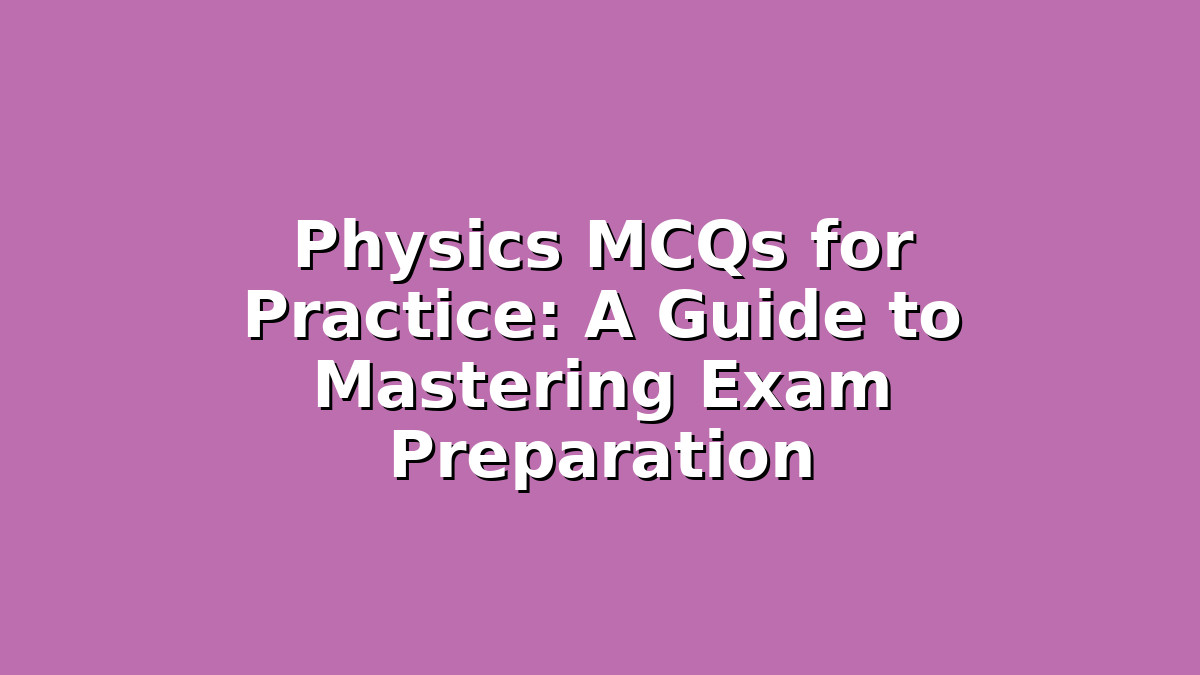Preparing for physics exams can feel overwhelming, especially when faced with complex concepts and challenging problem-solving questions. One of the most effective ways to prepare is by practicing multiple-choice questions (MCQs). Physics MCQs not only help reinforce key concepts but also improve your speed, accuracy, and exam confidence.
In this article, we will explore why practicing physics MCQs is essential for students, share useful study tips to maximize your learning, and recommend strategies to approach MCQ sections with confidence. Whether you are preparing for high school board exams, university-level tests, or competitive entrance exams, this guide is designed to help you succeed.
Why Practice Physics MCQs?
Multiple-choice questions are a common format in physics exams because they test both conceptual understanding and problem-solving skills efficiently. Here are some reasons why practicing MCQs should be a core part of your study routine:
1. Reinforcement of Concepts: Physics covers a vast array of topics—from mechanics and thermodynamics to electromagnetism and optics. MCQs often focus on testing fundamental principles, helping you solidify your grasp on important theories and formulas.
2. Identification of Knowledge Gaps: Answering MCQs regularly can reveal which topics you are strong in and which require more attention. This targeted self-assessment helps you focus your study time effectively.
3. Improvement of Exam Technique: MCQs require careful reading and analysis of each option. Practicing these questions sharpens your critical thinking and decision-making skills, enabling you to eliminate incorrect answers quickly during the exam.
4. Time Management: Timed MCQ practice trains you to solve problems more quickly while maintaining accuracy—a crucial skill for time-bound exams.
Section 1: How to Choose the Right Physics MCQs for Practice
Not all physics MCQs are created equal. To get the most out of your practice, it’s important to choose questions that are relevant and challenging. Here’s how to select the best MCQs for your study plan:
– Follow Your Syllabus: Make sure the questions you practice align with your exam syllabus. This guarantees that you are focusing on topics that will actually appear on your test.
– Use Quality Study Materials: Look for MCQs from reputable textbooks, past exam papers, and trusted online educational platforms. Quality resources provide well-structured questions with clear explanations.
– Include a Mix of Difficulty Levels: Start with easier questions to build confidence, then gradually move on to medium and hard-level MCQs. This approach prepares you to tackle any question difficulty on exam day.
– Look for Explanations: Practice sets that include detailed answer explanations help you understand mistakes and learn the correct concepts rather than just memorizing answers.
– Update Your Question Bank Regularly: Physics is a dynamic subject where new types of questions or exam formats may emerge. Keep practicing updated question papers to stay current.
Section 2: Effective Techniques for Practicing Physics MCQs
Once you have selected the right MCQs, adopting effective techniques will maximize your benefits. Here are some proven methods:
– Simulate Exam Conditions: Set a timer and practice MCQs in a quiet, distraction-free environment. Mimicking exam conditions helps reduce anxiety and improves your time management skills.
– Use the Process of Elimination: Often, even if you don’t immediately know the answer, you can eliminate clearly wrong options. This increases your chance of selecting the correct option.
– Understand ‘Why’ Behind Answers: Review explanations for each question, especially the ones you got wrong. Understanding the reasoning behind answers helps deepen your conceptual clarity.
– Create a Mistake Log: Maintain a notebook where you record questions you struggled with and the concepts involved. Regularly revisit this log to track your progress and reinforce weak areas.
– Mix Topics in Practice Sessions: Instead of practicing questions topic-wise, mix different physics topics in a single session. This simulates the variety seen in actual exams and keeps your mind alert.
– Practice Regularly, Not Just Before Exams: Consistent practice over weeks or months is more effective than last-minute cramming. Small, daily practice sessions lead to better long-term retention.
Section 3: Additional Study Tips to Complement Physics MCQ Practice
Practicing MCQs is powerful, but it works best when combined with broader study strategies. Here are some tips to complement your MCQ preparation:
– Review Your Textbook and Class Notes: Before jumping into MCQs, ensure that you have a strong theoretical foundation by thoroughly studying your textbooks and notes.
– Use Visual Aids and Diagrams: Many physics concepts are easier to understand visually. Use diagrams, flowcharts, and mind maps to grasp complex ideas like wave behavior, circuit diagrams, or kinematics.
– Form Study Groups: Discussing difficult MCQs with peers can provide new perspectives and clarify doubts. Teaching others is also a great way to reinforce your own understanding.
– Solve Numerical Problems: Physics is as much about calculations as about theory. Along with MCQs, practice numerical problems to enhance your problem-solving speed and accuracy.
– Stay Positive and Take Breaks: It’s normal to encounter difficult questions. Maintain a positive attitude, avoid burnout by taking regular breaks, and reward yourself for progress.
– Use Online Quiz Platforms: Many websites and apps offer interactive physics MCQs with instant feedback. These can be fun and engaging ways to supplement traditional study.
Conclusion
Physics MCQs are a valuable tool for students preparing for exams. They help reinforce concepts, identify areas for improvement, and build exam-taking skills like speed and accuracy. By selecting quality questions, practicing effectively, and combining your MCQ work with other study strategies, you can boost your confidence and performance on physics tests.
Remember, consistent effort and a positive mindset are your best allies. Start incorporating physics MCQs into your daily study routine today, and watch your understanding and exam results improve!
Good luck with your physics journey!

Responses